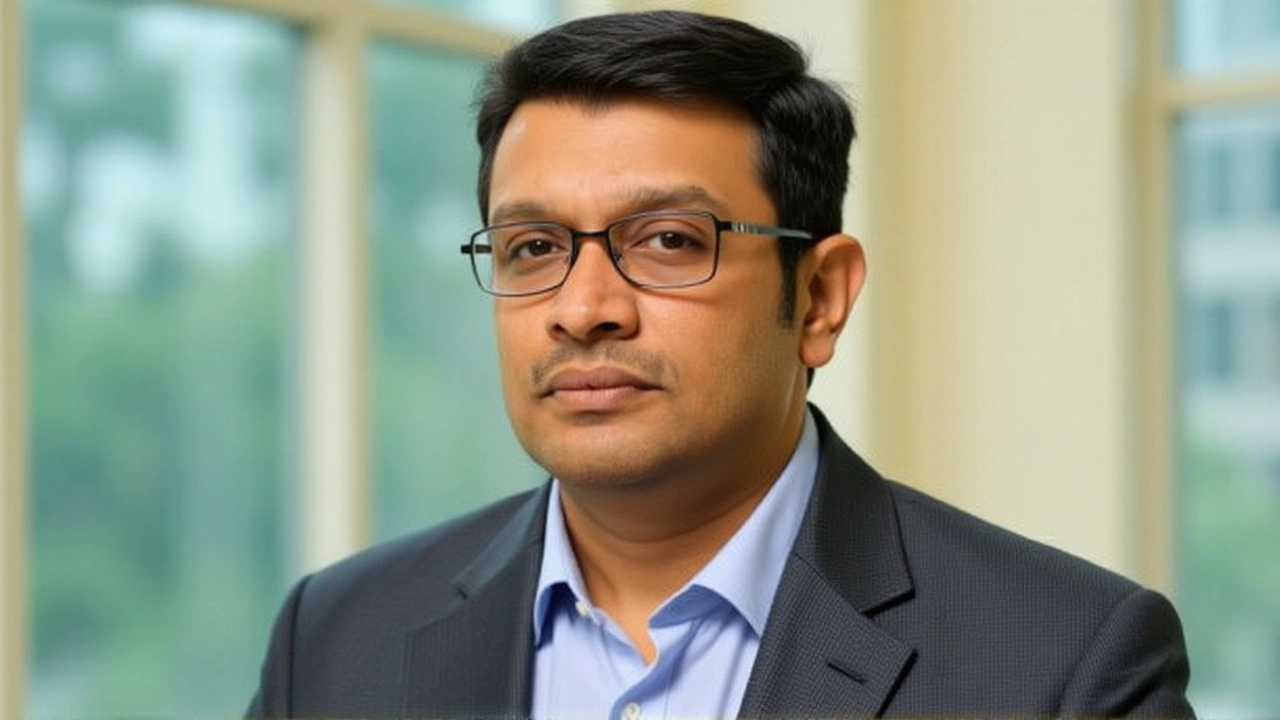When Jaguar Land Rover named Pathamadai Balachandran Balaji as its next CEO, it wasn’t just a personnel change — it was a seismic shift in identity. Effective mid-November 2025, Balaji, 54, will take the helm from retiring CEO Adrian Mardell, becoming the first Indian national and first executive from parent company Tata Motors to lead the storied British luxury automaker since Tata Group bought it in 2008. The announcement, made on August 4, 2025, signals more than succession. It’s a strategic alignment — finance meets transformation, and India’s industrial muscle meets Britain’s automotive soul.
From CFO to CEO: A Quiet Rise
Balaji didn’t burst onto the scene. He climbed. Starting at Unilever in 1995, he spent over 20 years building supply chain and finance expertise across continents — from Mumbai to London, Singapore to Zurich. His move to Tata Motors in 2017 as Group CFO was seen as a stabilizing move. But behind the scenes, he was already embedded in JLR’s boardroom. Since December 2017, he’s served as a non-executive director at Jaguar Land Rover, quietly learning its operations, its culture, its pain points. That’s rare. Most CEOs are imported. Balaji was cultivated."He knows the company," said Natarajan Chandrasekaran, Chairman of Jaguar Land Rover PLC, Tata Motors, and Tata Sons. "He’s worked with the JLR leadership team. This ensures we continue to accelerate our journey to Reimagine JLR."
That phrase — "Reimagine JLR" — is the heartbeat of the company right now. And Balaji’s resume? It’s the perfect key.
The Reimagine Challenge
Jaguar Land Rover isn’t just transitioning to electric vehicles — it’s rebuilding its bones. The first fully electric Jaguar, due in 2026, will be a make-or-break moment. By 2030, every model must be electric. By 2039, net-zero emissions. That’s not a goal. It’s a revolution.And it’s expensive. The company is pouring billions into a UK-based gigafactory under the Tata Group umbrella — a move that demands new suppliers, new logistics chains, and new cost structures. Balaji’s finance background is critical here. At Tata Motors, he helped steer the company through volatile markets, tight margins, and global tariff wars. He didn’t just balance books — he restructured them. Now, he’ll need to do the same for JLR’s supply chain, which is tangled in Brexit-era regulations, U.S. Inflation Reduction Act incentives, and EU battery mandates.
"He’s the guy who’s navigated Unilever’s global supply chains and Tata’s complex manufacturing networks," said one industry analyst familiar with the transition. "If anyone can untangle JLR’s cost structure while keeping premium quality intact, it’s him."
A New Leadership Trio
Balaji isn’t stepping in alone. Simultaneously, Nigel Blenkinsop, formerly Executive Director of Enterprise Performance and Quality, has been promoted to Chief Transformation Officer — reporting directly to Balaji. Blenkinsop’s job? To execute the "Reimagine" plan. Think factory upgrades, software integration, dealer network modernization. It’s the operational engine. Balaji is the strategist. Together, they form a rare dual-power structure: finance meets execution.This isn’t just about cars. It’s about culture. JLR’s workforce, deeply rooted in British engineering tradition, has watched years of leadership come and go — mostly from outside the Tata ecosystem. Balaji’s appointment signals that Tata isn’t just an owner anymore. It’s a partner. A co-architect. And for the first time, the CEO’s office at Whitley will have an Indian nameplate.

Why This Matters Beyond the Boardroom
This transition is symbolic. For decades, British automotive brands were seen as the crown jewels of national identity — owned by Germans, Americans, or French. When Tata bought JLR in 2008, many feared cultural erosion. Instead, Tata preserved the brand’s soul while injecting discipline, scale, and long-term vision. Balaji’s rise proves that the fusion worked. It’s not about replacing Britishness with Indianness. It’s about evolving it.And the stakes? Higher than ever. EV sales in Europe are slowing. China’s electric car makers are undercutting prices. Tesla keeps innovating. JLR can’t afford missteps. Balaji’s experience managing global teams across cultures, currencies, and regulations could be the edge JLR needs.
"These three years have been a great privilege," said retiring CEO Adrian Mardell. "I wish Balaji every success."
It’s a quiet farewell from a man who led JLR through record profits and pandemic chaos. Now, the baton passes to someone who’s spent decades mastering the numbers — and who, by all accounts, understands that luxury isn’t just about leather and wood. It’s about reliability, sustainability, and trust.
What’s Next?
Balaji’s first 100 days will be watched closely. Will he keep JLR’s design teams autonomous? Will he push for faster EV rollouts? Will he tap into Tata’s Indian supply chain for cost efficiencies — and risk backlash from traditionalists?One thing’s certain: He won’t be flying solo. The gigafactory construction in the UK is already underway. Battery cell sourcing deals are being signed. And the first electric Jaguar prototype? It’s been road-tested in cold climates near Stockholm. The car is ready. Now, the man behind the wheel is too.
Frequently Asked Questions
Why is PB Balaji’s appointment historic for Jaguar Land Rover?
Balaji is the first Indian national and the first executive from Tata Motors to lead JLR since Tata’s 2008 acquisition. While previous CEOs came from within JLR’s European legacy or other global automakers, his background in finance and supply chain — honed at Unilever and Tata — signals a deeper integration between the parent company and the British brand, marking a new chapter in global automotive leadership.
How does Balaji’s finance background help JLR’s electric transition?
Building EVs requires massive upfront investment in batteries, factories, and software. Balaji’s track record at Tata Motors involved optimizing global supply chains, managing currency risks, and driving profitability amid volatility. He’s uniquely positioned to control costs while scaling production — critical as JLR races to hit its 2030 electrification target without sacrificing margins or quality.
What role does Nigel Blenkinsop play in this leadership shift?
As Chief Transformation Officer, Blenkinsop is responsible for executing JLR’s "Reimagine" plan — upgrading factories, integrating software systems, and modernizing dealer networks. He reports directly to Balaji, creating a clear division: Balaji sets strategy and secures resources, while Blenkinsop delivers operational change. This tandem structure is designed to prevent the misalignment that has plagued other automakers during EV transitions.
What impact will JLR’s UK gigafactory have on the local economy?
The gigafactory, backed by Tata Group, is expected to create over 2,000 direct jobs and thousands more in supplier networks across the Midlands. It’s also a strategic response to the UK’s post-Brexit industrial policy and the EU’s battery regulations. By producing cells locally, JLR reduces reliance on Asian imports, cuts logistics costs, and qualifies for U.S. and EU green subsidies — making its EVs more competitive globally.
Is there resistance to an Indian CEO leading a British icon?
Publicly, there’s been little pushback. JLR’s workforce has seen Tata’s commitment to preserving engineering heritage. Balaji’s decades-long familiarity with the company, combined with his respect for British craftsmanship, has eased concerns. Internally, leadership sees this as continuity — not cultural replacement. The brand’s identity is being redefined not by nationality, but by performance and innovation.
What’s the timeline for JLR’s electric vehicle rollout?
JLR plans to launch its first fully electric Jaguar in 2026. By 2030, every vehicle in its lineup will be electric — including Range Rover and Land Rover models. The company is targeting carbon net-zero emissions across its operations by 2039. Balaji’s leadership will be critical in meeting these deadlines without compromising the premium positioning JLR has spent decades building.
